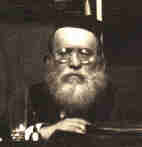 |
Hadrash Ve-Haiyunby the Reisha Rav, HaGoan Rav Aaron Levine TZ"LElucidated and Adapted by Efraim Levine |
 |
Hadrash Ve-Haiyunby the Reisha Rav, HaGoan Rav Aaron Levine TZ"LElucidated and Adapted by Efraim Levine |
Devarim
Dedicated
in Honor of
all our Hadrash Ve-Haiyun Readers
To Dedicate Please Contact Hadrash Ve-Haiyun
These are the words that Moshe spoke to all Yisroel (Devarim 1:1)
The Sifri comments that wherever in the Torah or Neviyum we find the phrase “these are the words” it refers to rebuke. Examples include, “The words of Amos” (Amos 1:1), “These are the words that Hashem spoke to Yisroel and Yehudah” (Yirmiyaho 30:4), “These were Dovid’s last words” (Shmual 2 23:1) and “The words of Koheles the son of Dovid king of Yerushalayim” (Koheles 1:1). In the above examples the phrase “these are the words” are used but from the context it is clear that they are word of rebuke. Likewise, sefer Devarim opens with the phrase “These are the words” since it contains words of rebuke that Moshe gave Klall Yisreol.
It is noteworthy that the word Devarim also is related to the word divorah, i.e., bee. Indeed, the midrash here comments that the Jewish people are compared to bees.
Perhaps we may suggest that the two aforementioned ideas are not isolated but rather complement one another.
Bees are fascinating creatures. They possess many commendable traits. Examples include their unique sense of mission displayed in their lifelong construction of the beehive. Within the chaos of construction we find an extremely orderly division of labor. Some are involved with the collection of pollen. Other are busy with the purification of honey, other attend the needs of the queen, yet other stand guard. Each bee does not deviate form its task in any way whatsoever. They display unusual respect for the queen, even to the point of never stepping in front of her. Their display of unity is exceptional. They stay together in large swarms not found to the same degree in any other creature. They are meticulous with regard to their cleanliness, as absolutely no waist is permitted within the hive. In summation the bee is a symbol of mission, discipline, respect and unity. However, let us not forget that the bee can inflict a deadly sting with its mouth, symbolic of the stinging words of rebuke that emanate from the mouth.
In conclusion the word devarim has a double interpretation. On the one hand it refers to words of rebuke but on the other hand it is also related to the bee. The conveyed message is that not all are worthy of giving rebuke. Only one who follows in the exemplary character of the bee can sting others with words of rebuke. Only one who first perfects his own character with a sense of mission, discipline, respect and unity can be worthy of having his rebuke received by others.
This is summarized by the dictum of Chazal, “first beautify yourself and only them attempt to beautify others.”
In addition, we find another similarity between the bees and rebuke. Chazal teach us that Yaakov and Moshe waited until the end of their lives to give rebuke. They knew that the tradeoff of strong rebuke is that the recipient would come to dislike them. They waited until the very end when the ill feeing caused by rebuke would be offset with their own demise. This concept is also expressed in the Gemara where it relates that if you find a community were the people love their Rav, it is not because he is good to them but because he does not rebuke them. Had he rebuked them they would not love him the same.
This message is also found with regard to the bee. After a bee stings its victim it immediately dies. The message is that rebuke comes with a price. There is an unavoidable loss of connection between the two parties, just as the bee dies and becomes unknown to its victim. Strong rebuke must be used sparingly. Rebuke has a price and one must weigh the benefits against the loss to evaluate if it is truly called for.